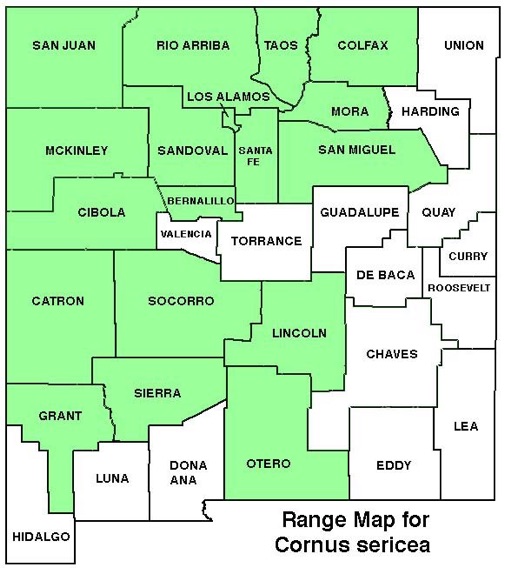WILDFLOWERS OF NEW MEXICO

This streamside, multi-stemmed shrub reaches 12 feet tall, has red to purple branches, broad, opposite leaves, and dense, flat-topped to rounded clusters of small white flowers followed by white, berry-like drupes. It forms thickets in moist soils, and with its red stems, is popular for winter color in landscape settings.
FLOWER: May–August. Clusters 1–3 inches across (25–75 mm) packed with small, white to cream flowers with 4 tiny, spreading, pointed petals, each 1/8 inch long (3 mm). Fruit is a white drupe 3/8 diameter (7–9 mm) with 2 seeds.
LEAVES: Opposite, stalked; blades lance-shaped to elliptic or oval, 2–4 inches long (5–10 cm); edges entire, top surface green, smooth, with 5–7 prominent lateral veins, bottom whitish, sparsely hairy, tip pointed.
HABITAT: Stream banks, moist areas, partial shade in woodland understory.
ELEVATION: 5,000–10,500 feet (1515–3030 m).
RANGE: Widespread, common in all western states, northern tier of states to Maine; Canada.
SIMILAR SPECIES: This is the only shrubby dogwood in NM. Also called C. stolonifera
(Flora Neomexicana III) and C. alba in various sources.
NM COUNTIES: Mid- to high-elevation mountains of NM: Bernalillo, Catron, Cibola, Colfax, Grant, Lincoln, Los Alamos, McKinley, Mora, Otero, Rio Arriba, San Juan, San Miguel, Sandoval, Santa Fe, Sierra, Socorro, Taos.









RED-OSIER DOGWOOD
CORNUS SERICEA (C. STOLONIFERA)
Dogwood Family, Cornaceae
Deciduous shrub



























THE CONTENTS OF THIS WEBSITE ARE COPYRIGHTED AND CANNOT BE USED
WITHOUT PERMISSION OF GEORGE OXFORD MILLER
















EMAIL ME



























Leaves have prominent lateral veins.
Thicket-forming shrubs have multiple, branching stems.
Branches and leavers are opposite on the red stems.










In the winter, the leaves fall exposing the attractive red branches.
Fruit are small, white, berry-like drupes.







